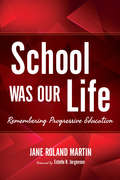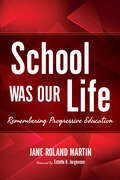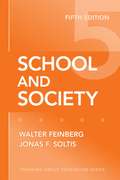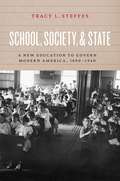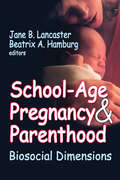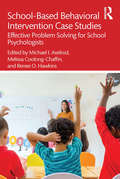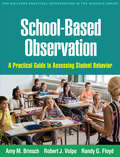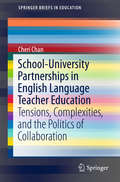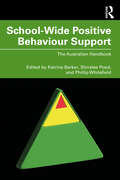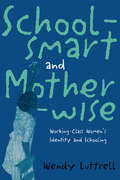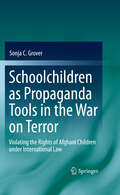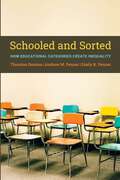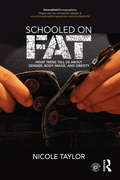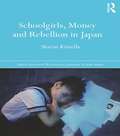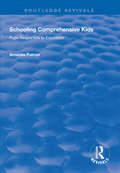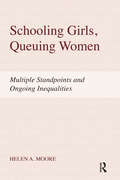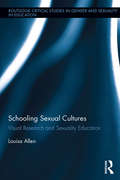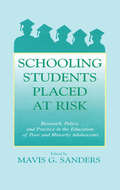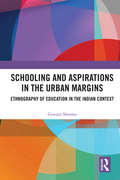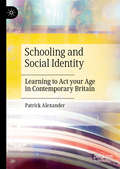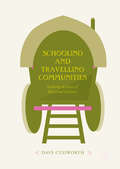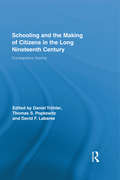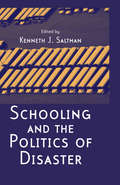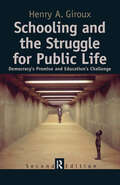- Table View
- List View
School Was Our Life: Remembering Progressive Education (Counterpoints: Music and Education)
by Estelle R. Jorgensen Jane Roland MartinThe late 1930s and early 1940s were the peak of progressive education in the United States, and Elisabeth Irwin's Little Red School House in New York City was iconic in that movement. For the first time, stories and recollections from students who attended Little Red during this era have been collected by author Jane Roland Martin. Now in their late eighties, these classmates can still sing the songs they learned in elementary school and credit the progressive education they loved with shaping their outlooks and life trajectories. Martin frames these stories from the former students "tell it like it was" point of view with philosophical commentary, bringing to light the underpinnings of the kind of progressive education employed at Little Red and commenting critically on the endeavor. In a time when the role of the arts in education and public schooling itself are under attack in the United States, Martin makes a case for a different style of education designed for the defense of democracy and expresses hope that an education like hers can become an opportunity for all.
School Was Our Life: Remembering Progressive Education (Counterpoints: Music and Education)
by Jane Roland MartinPersonal accounts of the early days of New York City’s Little Red School House, analysis of its success, and a look at the future of education.The late 1930s and early 1940s were the peak of progressive education in the United States, and Elisabeth Irwin’s Little Red School House in New York City was iconic in that movement. For the first time, stories and recollections from students who attended Little Red during this era have been collected by author Jane Roland Martin. Now in their late eighties, these classmates can still sing the songs they learned in elementary school and credit the progressive education they loved with shaping their outlooks and life trajectories. Martin frames these stories from the former students “tell it like it was” point of view with philosophical commentary, bringing to light the underpinnings of the kind of progressive education employed at Little Red and commenting critically on the endeavor. In a time when the role of the arts in education and public schooling itself are under attack in the United States, Martin makes a case for a different style of education designed for the defense of democracy and expresses hope that an education like hers can become an opportunity for all.“This sparkling, intimate, and delightfully written memoir demonstrates conclusively how and why elementary education should be designed to fit the natural growth of the human mind.” —E.O. Wilson author of The Social Conquest of Earth“Drawing on her own experiences 75 years ago and those of her classmates, researchers and many others, [Jane Roland Martin] has made it clear why we, even though she and the rest of us privileged to have gone through Little Red can’t write cursive and never had to memorize facts and figures, are “The Lucky Ones.” She draws on memories of everything from class trips, to writing poetry, to group singing to explain why much of the conventional literature about progressive education has missed the story. If it’s too late for you to apply (or send your children and/or grandchildren) to Little Red, read School Was Our Life: Remembering Progressive Education. It’s the next best thing.” —Victor S. Navasky, publisher emeritus of The Nation
School and Society
by Jonas F. Soltis Walter Feinberg Pamela WolfbergThis widely used text has been expanded to include the most important issues in contemporary schooling, including new end-of-chapter sections for Further Reading and new references added to the useful Additional Resources section. School and Society, Fifth Edition uses realistic case studies, dialogues, and open-ended questions designed to stimulate thinking about problems related to school and society, including curriculum reform, social justice, and competing forms of research. Written in a style that speaks directly to today's educator, this book tackles such crucial questions as: Do schools socialize students to become productive workers? * Does schooling reproduce social class and pass on ethnic and gender biases? * Can a teacher avoid passing on dominant social and cultural values? * What besides subjects do students really learn in schools? School and Society is one of the five books in the highly regarded Teachers College Press Thinking About Education Series, now in its Fifth Edition. All of the books in this series are designed to help pre- and in-service teachers bridge the gap between theory and practice.
School, Family, and Community Partnerships
by Joyce L. EpsteinUpdated and revised throughout, Joyce EpsteinOCOs classic book provides a framework for thinking about, talking about, and actually building comprehensive programs for school and family partnerships.
School, Society, & State: A New Education to Govern Modern America,1890-1940
by Steffes Tracy L."Democracy has to be born anew every generation, and education is its midwife," wrote John Dewey in his classic work The School and Society. In School, Society, and State, Tracy Steffes places that idea at the center of her exploration of the connections between public school reform in the early twentieth century and American political development from 1890 to 1940. American public schooling, Steffes shows, was not merely another reform project of the Progressive Era, but a central one. She addresses why Americans invested in public education and explains how an array of reformers subtly transformed schooling into a tool of social governance to address the consequences of industrialization and urbanization. By extending the reach of schools, broadening their mandate, and expanding their authority over the well-being of children, the state assumed a defining role in the education--and in the lives--of American families. In School, Society, and State, Steffes returns the state to the study of the history of education and brings the schools back into our discussion of state power during a pivotal moment in American political development.
School-Age Pregnancy and Parenthood: Biosocial Dimensions
by Beatrix A. HamburgThis important work examines in detail and depth how, as a consequence of changing technologies, diet, patterns of reproduction, and work, relations between children and parents have altered.The editors and contributors hold that biosocial science is particularly relevant to research on human family systems and parenting behavior. The family is the universal social institution in which the care of children is based and the turf where cultural tradition, beliefs, and values are transmitted to the young as they fulfill their biological potential for growth, development and reproduction. The biosocial perspective takes into account the biological substratum and the social environment as critical co-determinants of behavior and pinpoints areas in which contemporary human parental behavior exhibits continuities with and departures from, patterns evident throughout history.This work crosses disciplinary lines without ignoring their relevance to the broader themes of the book. School age pregnancy and parenthood is a powerful anchor for the dissection of large scale issues. The contributors deal in turn with ethnic and historical experience, examine normative and ethical issues, and cast new light on methodological concerns. What the editors call culturally-defined responses to basic needs helps explain both dramatic improvements in this area, and how they expand the challenge of teen reproduction. Contributors emphasize new demands for training and education to research this growing phenomenon. The book contributes to humane concerns as well as the scientific imagination.
School-Based Behavioral Intervention Case Studies: Effective Problem Solving for School Psychologists
by Michael I. Axelrod Melissa Coolong-Chaffin Renee O. HawkinsSchool-Based Behavioral Intervention Case Studies translates principles of behavior into best practices for school psychologists, teachers, and other educational professionals, both in training and in practice. Using detailed case studies illustrating evidence-based interventions, each chapter describes all the necessary elements of effective behavior intervention plans including rich descriptions of target behaviors, detailed intervention protocols, data collection and analysis methods, and tips for ensuring social acceptability and treatment integrity. Addressing a wide array of common behavior problems, this unique and invaluable resource offers real-world examples of intervention and assessment strategies.
School-Based Observation: A Practical Guide to Assessing Student Behavior
by Amy M. Briesch Robert J. Volpe Randy G. FloydWidely used to assess social–emotional and behavioral referral concerns in grades PreK–12, systematic direct observation is an essential skill for school psychologists and other educators. This accessible book helps practitioners conduct reliable, accurate observations using the best available tools. Chapters present effective coding systems for assessing student classroom behavior, the classroom environment, behavior in non-classroom settings, and behavior in a functional assessment context; also provided are guidelines for developing new codes when an appropriate one does not already exist. Procedures for summarizing, graphing, and interpreting data for different assessment purposes are detailed. In a large-size format with lay-flat binding for easy photocopying, the book includes 13 reproducible coding forms. Purchasers get access to a Web page where they can download and print the reproducible materials. This book is in The Guilford Practical Intervention in the Schools Series, edited by T. Chris Riley-Tillman.
School-University Partnerships in English Language Teacher Education
by Cheri ChanThis book addresses the complex issues that arise in school-university collaborative action research projects. Employing sociocultural perspectives on examining professional practices of in-service teachers, it examines the complexities of negotiating beliefs, identities and interpersonal relations when educators from two different institutional cultures collaborate. Specifically, the book explores issues such as the discourses that are operative in school-university collaboration for English language teacher education; the way in which beliefs, interpersonal relations and identities are negotiated in school-university partnership; what tensions and complexities operate in collaborative action research discourse in an educational context; and how school-university collaboration can be achieved. The book adopts a critical perspective and provides arguments from a non-Western sociocultural perspective.
School-Wide Positive Behaviour Support: The Australian Handbook
by Katrina Barker Shiralee Poed Phillip WhitefieldDrawing upon twenty years of experience putting the Positive Behaviour Support (PBS) framework into practice, this is the first definitive handbook to document the ways in which Australian schools have embraced and applied school-wide PBS, and to provide guidance on implementation. Written by key Australian researchers and implementers with extensive expertise, School-Wide Positive Behaviour Support: The Australian Handbook is an important contribution to the work of school leaders and teachers. This book illustrates the significant contribution of PBS to improving schools and the potential for its systems approach to be expanded across education systems. The book’s structure corresponds to the theme of a continuum of supports, addressing the key conceptual foundations of PBS and its representation within school-wide implementation. Each chapter comprises a mix of research, practical case studies and examples, and features learning intentions, keywords, further reading, advice on applying your ideas, and links to the Australian Professional Standards for Teachers. PBS has gained significant attention in Australia over the past two decades and its principles now underpin many successful systems and practices in schools and community and disability services. This book will be a foundational resource for implementers and coaches of PBS, educational leaders and policy advisors, pre- and in-service teachers, as well as researchers.
School-smart and Mother-wise: Working-Class Women's Identity and Schooling (Perspectives on Gender)
by Wendy LuttrellSchool-smart and Mother-wise illustrates how and why American education disadvantages working-class women when they are children and adults. In it we hear working-class women--black and white, rural and urban, southern and northern--recount their childhood experiences, describing the circumstances that led them to drop out of school. Now enrolled in adult education programs, they seek more than a diploma: respect, recognition, and a public identity. Drawing upon the life stories of these women, Wendy Luttrell sensitively describes and analyzes the politics and psychodynamics that shape working-class life, schooling, and identity. She examines the paradox of women's education, particularly the relationship between schooling and mothering, and offers practical suggestions for school reform.
Schoolchildren as Propaganda Tools in the War on Terror
by Sonja C. GroverThis book explores in what ways both sides involved in the so-called war on terror are using schoolchildren as propaganda tools while putting the children's security at grave risk. The book explores how terrorists use attacks on education to attempt to destabilize the government while the government and the international aid community use increases in school attendance as an ostensible index of largely illusory progress in the overall security situation and in development. The book challenges the notion that unoccupied civilian schools are not entitled under the law of armed conflict to a high standard of protection which prohibits their use for military purposes. Also examined are the potential violations of international law that can occur when government and education aid workers encourage and facilitate school attendance, as they do, in areas within conflict-affected states such as Afghanistan where security for education is inadequate and the risk of terror attacks on education high.
Schooled and Sorted: How Educational Categories Create Inequality
by Thurston Domina Andrew M. Penner Emily K. PennerSociety primarily views education as a way to teach students skills and knowledge that they will draw upon as they move into their adult lives. However, schools do more than educate students – they also place students into categories, such as kindergartner, English language learner, and honor roll student. But do these categories have larger consequences than simply sorting students into classrooms? In Schooled & Sorted Thurston Domina, Andrew M. Penner, and Emily K. Penner, explore how educational categories reify and reinforce powerful existing social categories – including race, ethnicity, and class – and ultimately reproduce social and economic inequality in broader society. Domina and colleagues argue that while education is often seen as a tool for social mobility and reducing inequality, categories used in schools shape students’ access to resources, which ultimately have far-reaching impacts on their lives. The authors assert that the classes students are sorted into influence their educational experiences – students who are placed in higher-tracked classes are believed to have stronger academic skills than students in lower-tracked classes. As a result, more resources are often devoted to students in higher-tracked classes. Because many measures of academic achievement reflect values of the status quo, white, affluent students are overrepresented in these track assignments, leading to a reproduction of societal status and resource inequality within schools. This inequality within schools translates into lasting inequalities in the adult world. Society views educational achievement to be based on merit – high achievers have done well because they worked hard and are rewarded with resources, status, and power, including high-paying, high-status jobs at prestigious organizations. Those with lower educational status, on the other hand, are seen as undeserving and are therefore sorted into lower-paid jobs in lower-status professions and hold less influence. Domina and colleagues contend, however, that while educational categorization is unavoidable, a more equitable system, and thus a more equitable society, can be built. A key component is to build and uphold categories that emphasize educational goods that are inherently valuable, such as the ability to read, as opposed to those that derive value from scarcity, such as status and prestige. Schooled & Sorted is an illuminating investigation into the ways sorting within schools translates to sorting – and inequality – into the larger world.
Schooled on Fat: What Teens Tell Us About Gender, Body Image, and Obesity
by Nicole TaylorObesity has dominated popular media as one of the most pressing issues of the new millennium. In the US, high rates of obesity, and by extension, fat people are often blamed for rising health-care costs and a weakening of national security. What does it mean to be considered fat during a time when obesity is framed as a threat? When body fat is the enemy, how does the line between "acceptable" and "too fat" get defined moment-to-moment as people make value judgments about each other's bodies in the course of everyday life? Nicole Taylor explores how teens navigated the fraught realities of body image within a high school culture that reinforced widespread beliefs about body size as a matter of personal responsibility while offering limited opportunity to exercise and an abundance of fattening junk foods. Drawing on daily observations, interviews, and focus groups with teens, Schooled on Fat takes the reader into their lives to show how, through everyday language, they managed their body size, social status, and identities as body-conscious individuals. Taylor traces policy efforts to illustrate where we are as a nation in addressing childhood obesity and offers practical strategies schools and parents can utilize to promote teen wellness.
Schoolgirls, Money and Rebellion in Japan (Nissan Institute/Routledge Japanese Studies)
by Sharon KinsellaJapanese society in the 1990s and 2000s produced a range of complicated material about sexualized schoolgirls, and few topics have caught the imagination of western observers so powerfully. While young Japanese girls had previously been portrayed as demure and obedient, in training to become the obedient wife and prudent mother, in recent years less than demure young women have become central to urban mythology and the content of culture. The cultic fascination with the figure of a deviant school girl, which has some of its earliest roots in the nineteenth and early twentieth centuries, likewise re-emerged and proliferated in fascinating and timely ways in the 1990s and 2000s. Through exploring the history and politics underlying the cult of girls in contemporary Japanese media and culture, this book presents a striking picture of contemporary Japanese society from the 1990s to the start of the 2010s. At its core is an in-depth case study of the media delight and panic surrounding delinquent prostitute schoolgirls. Sharon Kinsella traces this social panic back to male anxieties relating to gender equality and female emancipation in Japan. In each chapter in turn, the book reveals the conflicted, nostalgic, pornographic, and at times distinctly racialized manner, in which largely male sentiments about this transformation of gender relations have been expressed. The book simultaneously explores the stylistic and flamboyant manner in which young women have reacted to the weight of an obsessive and accusatory male media gaze. Covering the often controversial subjects of compensated dating (enjo kôsai), the role of porn and lifestyle magazines, the historical sources and politicized social meanings of the schoolgirl, and the racialization of fashionable girls, Schoolgirls, Money, Rebellion in Japan will be invaluable to students and scholars of Japanese culture and society, sociology, anthropology, gender and women's studies.
Schooling Comprehensive Kids: Pupil Responses to Education (Routledge Revivals)
by Amanda PalmerFirst published in 1998, this volume is based upon an ethnographic study of white and black in a mixed comprehensive school conducted during the 1980s and explores differentiation in the classroom, looking at gender, colour and class differences within groups of students. The findings are discussed in the light of the strong debate within the sociology of education that took place during the 1970s and 1980s concerning academic achievement and underachievement. Amanda Palmer reveals, in contribution to this debate, that class origins played a primary role in the formation of pupils’ attitudes towards school and that class, race and gender were involved in how teachers reacted to pupils
Schooling Girls, Queuing Women
by Helen A. MooreFocusing on the schooling of diverse girls and women in the United States, this book highlights topics of gendered curricula, racialized experiences of standardized testing, and dominant cultural socialization. By weaving critical education theories with sociological analyses of race, class and gender, Moore provides historical and contemporary illustrations of "hostile hallways" for students and the devaluation of teaching as a profession. In suggesting feminist and anti-racist pedagogical models of empowerment, Schooling Girls, Queuing Women presents several potential solutions to the problem of classroom inequality for diverse women and girls.
Schooling Sexual Cultures: Visual Research in Sexuality Education (Routledge Critical Studies in Gender and Sexuality in Education)
by Louisa AllenMoving beyond the traditional focus on curriculum and pedagogy, this volume explores hidden dimensions of sexuality education in schools and how sexual meanings are produced. Challenging the standard understandings of sexuality education, Allen discusses how students’ knowledge of sexualities is often learnt outside the ‘official’ school curriculum in informal spaces such as the sports field, gym locker rooms and peer groups. By employing visual methods and analysing student photo-diaries, Allen’s original book captures a sexual culture of schooling that allow readers to literally ‘see through young people’s eyes.’ Introducing theoretical ideas in relation to queer theory and ‘new’ feminist new materialisms, this volume calls for a re-conceptualization of how sexuality comes into being at school, in order to take account of its material, spatial and embodied elements.
Schooling Students Placed at Risk: Research, Policy, and Practice in the Education of Poor and Minority Adolescents
by Mavis G. SandersThis book examines historical approaches and current research and practice related to the education of adolescents placed at risk of school failure as a result of social and economic conditions. One major goal is to expand the intellectual exchange among researchers, policymakers, practitioners, and concerned citizens on factors influencing the achievement of poor and minority youth, specifically students in middle and high schools. Another is to encourage increased dialogue about policies and practices that can make a difference in educational opportunities and outcomes for these students. Although the chapters in this volume are not exhaustive, they represent an array of theoretical and methodological approaches that provide readers with new and diverse ways to think about issues of educational equality and opportunity in the United States. A premise that runs through each chapter is that school success is possible for poor and minority adolescents if adequate support from the school, family, and community is available. *The conceptual approach (Section I) places the research and practice on students placed at risk in a historical context and sets the stage for an important reframing of current definitions, research, policies, and practices aimed at this population. *Multiple research methodologies (Sections II and III) allow for comparisons across racial and ethnic groups as well as within groups, and contribute to different and complementary insights. Section III, "Focus on African-American Students," specifically addresses gender and social class differences among African-American adolescents. *Current reform strategies presently being implemented in schools throughout the United States are presented and discussed (Part IV). These strategies or programs highlight how schools, families, and communities can apply research findings like the ones this book presents, thus bridging the often wide gap between social science research and educational practice.
Schooling and Aspirations in the Urban Margins: Ethnography of Education in the Indian Context
by Gunjan SharmaThis book presents a detailed ethnographic study conducted in an urban slum in India. It explores how a State school, as a social and pedagogic institution, shapes the aspirations and worldviews of children in the urban margins. The volume engages with the children's experience of marginality and exclusion as they negotiate the intersecting axes of caste, class, gender, and citizenship. It further explores how their everyday school experience is mediated by the power asymmetries between the teachers and the community. In this process, it makes-sense of the political dynamics between the State and its margins while highlighting the role of schools and locating childhood in this context. Based on ethnographic fieldwork, the book will be of interest to researchers, students, and teachers of education studies, sociology and politics of education, teacher education, childhood and youth studies, and urban studies. It will also be useful for education policymakers, and professionals in the development sector.
Schooling and Social Identity: Learning to Act your Age in Contemporary Britain
by Patrick AlexanderThis book examines the nature of age as an aspect of social identity and its relationship to experiences of formal education. Providing a new and critical approach to debates about age and social identity, the author explores why age remains such an important aspect of self-making in contemporary society. Through an ethnographic account of a secondary school in the south-east of England, the author poses three principal questions. Why are schools in English organised according to age? How do pupils and teachers learn to ‘act their age’ while at school? Ultimately, why does age remain such an important and complex organising concept for modern society? Cutting across lines of class and gender, this timely book will be of interest to students and scholars of self-making and identity in educational contexts, and others interested in how schooling socialises young people into categories of age as the foundational building blocks of modern society.
Schooling and Travelling Communities: Exploring the Spaces of Educational Exclusion
by Dave CudworthThis book calls for a re-thinking of educational provision for Gypsy / Traveller communities. Despite having been recognised by the government and educational providers for over fifty years, underachievement of children from Gypsy / Traveller communities persists. Rather than focusing specifically on access, attendance and attainment, the author provides a structural analysis of the cultural tensions that often exist between Nomadic communities and current school provision based on the interests and values of Sedentarism. The author uses spatial theory as a base upon which to build knowledge and understanding of the educational exclusion of children from Gypsy / Traveller communities, highlighting the social role that space plays within schools. This innovative book will be of interest and value for students and scholars interested in not only education and Gypsy / Traveller communities, but education for minority communities more widely.
Schooling and the Making of Citizens in the Long Nineteenth Century: Comparative Visions (Routledge Research in Education)
by David F. Labaree Thomas S. Popkewitz Daniel TröhlerThis book is a comparative history that explores the social, cultural, and political formation of the modern nation through the construction of public schooling. It asks how modern school systems arose in a variety of different republics and non-republics across four continents during the period from the late eighteenth century to the early twentieth century. The authors begin with the republican preoccupation with civic virtue – the need to overcome self-interest in order to take up the common interest – which requires a form of education that can produce individuals who are capable of self-guided rational action for the public good. They then ask how these educational preoccupations led to the emergence of modern school systems in a disparate array of national contexts, even those that were not republican. By examining historical changes in republicanism across time and space, the authors explore central epistemologies that connect the modern individual to community and citizenship through the medium of schooling. Ideas of the individual were reformulated in the nineteenth century in reaction to new ideas about justice, social order, and progress, and the organization and pedagogy of the school turned these changes into a way to transform the self into the citizen.
Schooling and the Politics of Disaster: Taking And Breaking Public Schools (Cultural Politics And The Promise Of Democracy Ser.)
by Kenneth J. SaltmanSchooling and the Politics of Disaster is the first volume to address how disaster is being used for a radical social and economic reengineering of education. From the natural disasters of the Asian tsunami and the hurricanes in the Gulf Coast, to the human-made disasters in Iraq, Afghanistan, Haiti, Sudan, Indonesia, the United States and around the globe, disaster is increasingly shaping policy and politics. This groundbreaking collection explores how education policy is being reshaped by disaster politics. Noted scholars in education and sociology tackle issues as far-ranging as No Child Left Behind, the War on Terror, Hurricane Katrina, the making of educational funding crises in the US, and the Iraq War to bring to light a disturbing new phenonmemon in educational policy.
Schooling and the Struggle for Public Life: Democracy's Promise and Education's Challenge
by Henry A. GirouxThis book examines the relationship between democracy and schooling and argues that schools are one of the few spheres left where youth can learn the knowledge and skills necessary to become engaged, critical citizens. Not only is the legacy of democracy addressed through the work of John Dewey and others, but the democratic possibilities of schooling are analyzed through a range of issues extending from the politics of teacher authority to the importance of student voices. These issues have only become more vital in an era of neoliberalism and "smaller government," as Giroux discusses at length in this new updated edition.
